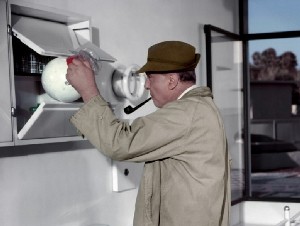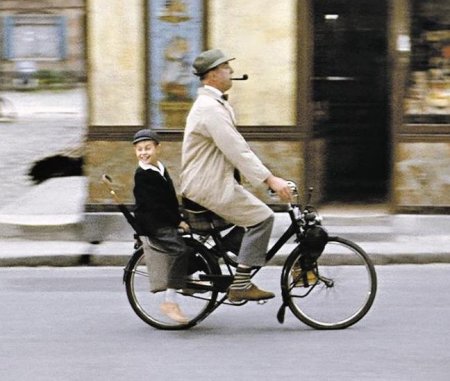The BFI is continuing its proud tradition of reverence to classic cinema with re-releases of French maestro Jacques Tati’s best known films. Mon Oncle was Tati’s second outing as one of his trademark characters Monsieur Hulot, who was first seen in Les Vacances de Monsieur Hulot, a clumsy simpleton who is lost in a modern world. The film is an important landmark in cinematic history showing Tati at his peak of physical comedy and satire which landed him awards at Cannes and the Oscars.
Tati resumes his comic assault on efficiency and aggressive high tech style of modern life. Hulot is the relative of the contemporary and affluent Arpels. Young Gerard (Alain Becourt) is rather fond of his uncle but parents Charles, the manager of a successful factory (Jean-Pierre Zola) and his wife, who maintains the home in a minimalist and germless fashion, (Adrienne Servantie) wish to get the aloof country dweller a job and a wife. Hulot makes for a humourous protagonist and antagonist to the many electric appliances dotted around the Arpel’s ultra modern abode.

Hulot is an affable buffoon, an inspiration for many others to come; certainly Peter Sellers owes some debt of gratitude to the man considered the comic artist of his time. Tati may include some downright silly physical goofs but his desire to satirise ridiculous situations and the inventiveness of his set designs is second to none. In the garden of the Arpel’s luxurious home is a large ceramic fish standing on its tail. Water fires from the fish’s mouth as a fountain into the pool of water below. A status symbol of wealth, Tati derides the facile nature of the city-dwellers as they only turn on their fountain when guests arrive. Not just any guests mind you, only the ones they are looking to impress.
The only problem with Tati’s more physical work is that it feels incredibly dated. Although only made in 1958, much of Mon Oncle feels like it was made in the Chaplin style in the era of silent cinema. Tati even reduces the amount of speech there is in his film with much of Hulot’s dialogue being a grumbled, inaudible noise. There are remarkable instances, such as Hulot’s country residence. Tati follows his protagonist around a building that has the occasional gap as to indicate his movements. Inventive and hilarious these scenes stand out amongst some of the more mundane moments of physical absurdity.
moments of physical absurdity.
Tati loves to highlight the difference between simple small town life and the preposterous nature of modern city living. Gerard is shown to fall in love with spending time with his uncle in his town and why not, the city is fraught with the concern of appearance while the country ambles along obliviously. With this kind of charm it is impossible to dislike Tati’s work even if it seems irrelevant. The timelessness of his satire means his work will never be completely out of date.
Mon Oncle is available on DVD/Blu-Ray from 29th October courtesy of the BFI
Follow Jonny on Twitter @joffglen




